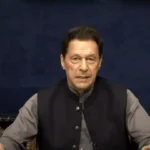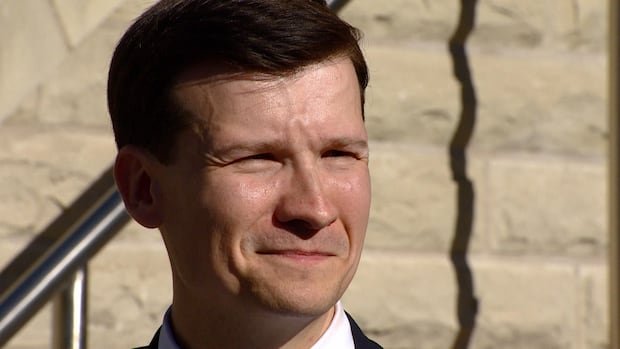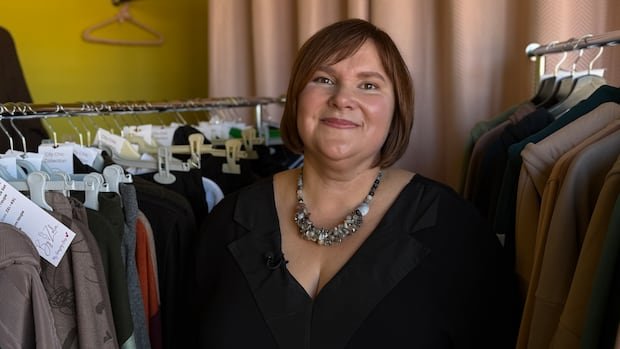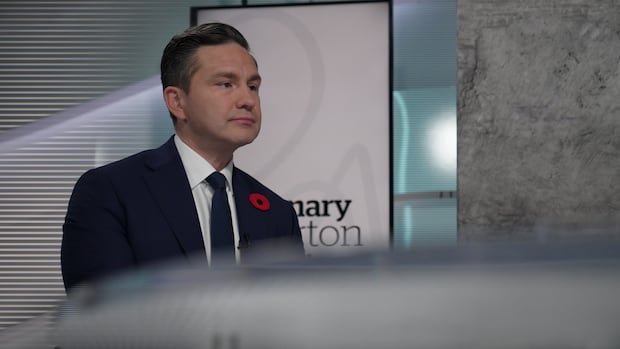It might confound some Calgarians that their new mayor likes saying he gained much of his leadership ability from a 24-week solo hike.
To best understand, journey in your mind to the Mather Pass, some 3,680 metres above sea level in California’s Sierra Nevada. On a rock cliff with barely enough room for two people, with three people stranded there.
It’s one of the more gruelling stretches of the Pacific Crest Trail, the Mexico-to-Canada trek he embarked on months after losing the 2021 Calgary mayoral race. Jeromy Farkas was confident he and his newfound hiking friends could shortcut through the pass.
A towering wall of ice and snow lay ahead of them, and they straight-shot toward it — as the morning sun began to turn their path to slush.
After one slip too many, he conceded defeat. “The mountains laugh at my ego and arrogance,” he wrote in an online journal.
Farkas was marooned on a cliff face for about 12 hours, along with Heisenberg and Bookie (they all used trail nicknames — he was Pathfinder, a moniker Farkas has carried with him since). Melting ice for drinking water, watching large rocks and ice chunks fall past their narrow perch, and doing loads of reflection — on his life on the trail and as a sure-headed city politician who’d tasted failure in that arena, too.
“The experience shook me. I still feel the embarrassment and shame for bringing things so close to the literal edge,” he’d write in the Calgary Herald.
“That failure — no, my failure — was the best teacher. I resolved that it would never happen again.”
He’d make it safely through Mather Pass and finish the hike.
Then, last week, he overcame another life-defining failure.
After shedding much of the combative conservative persona he had in four years as a city councillor and then 2021 mayoral candidate, Farkas won the top job on his second pass.
Farkas, 39, did so by carving a narrow electoral path through a canyon of more clearly progressive and conservative rivals. He became the first person to overcome a sitting Calgary mayor since 1980, before Farkas was born.
Now, another towering challenge stretches out before him — leading Calgary, a 1.6-million-person city teeming with pressures in housing, infrastructure and more. He’ll have to navigate through it with a mostly new council.
And success this time, according to past colleagues and new allies alike, will likely depend on Farkas proving he isn’t the guy who failed before.
‘I’ve made mistakes’
On the campaign trail, Jeromy Farkas often stuck to vagaries about his past shortcomings, while at the same time admitting they existed.
“Well, you know, I’ve made mistakes and I’ve learned from them, right? So the city’s grown in the past 10 years and so have I,” he said at his Oct. 15 platform launch. It was a line he’d repeat often in debates and interviews, along with talk of his humble beginnings as a kid from Calgary’s Dover neighbourhood, and his father’s arrival to Canada as a Hungarian refugee.
While courting as many Calgarians’ votes as possible — including those he’d earned in 2021 — he shied away from specifics about his personal changes.
But in the months and years in between his 2022 hike and 2025 campaign, he’d often mount rhetorical attack ads against his past self.
In August 2022, not yet finished his fundraising journey, he told CBC’s Daybreak Alberta he’d realized there was too much “ideological jackassery” in the first act of his political career.
He told a National Observer podcast in 2023 it made him regret his first mayoral bid. “Looking back I think I deserved to lose that campaign in terms of trying to run as a cardboard cutout of a conservative. I think I was very one-dimensional.”
Farkas told the podcast he was “embarrassed” about his Ward 11 councillor days of pushing ideas “so hard it became not enough for the idea to win — that I had to see the other person lose.” And he’d realized, too late, that an undecided observer “is probably going to side with the person who’s not being an asshole in that moment.”
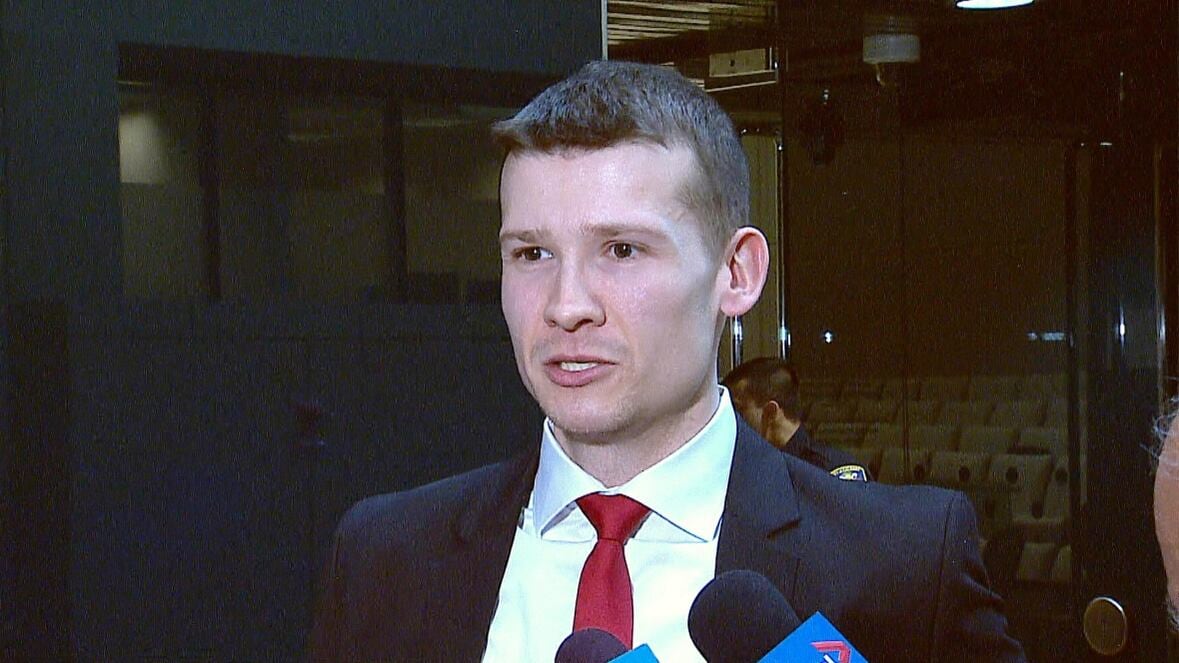
Former councillors during his 2017-2021 term agree with these self-assessments.
“He’d knock everyone else’s sandcastle so his was the highest rather than doing something to raise his castle or ideas to the top,” said Shane Keating, who represented neighbouring Ward 12, in an interview with CBC News.
He called Farkas a “disruptor” who was impossible to work with, never trying to rally support for his ideas like others did.
“It was more ‘you guys are doing it wrong, and I’m going to tell everyone you’re doing it wrong,’” Keating said.
At an April 2018 session, early on in Farkas’s tenure, colleagues came close to ejecting him from chambers over remarks about closed-door meetings. They branded his conduct “appalling,” “ludicrous” and “extremely insulting.”
They did eject him that December for claims about councillor pay raises, which then-mayor Naheed Nenshi called “dishonest and irresponsible.”
When the 14 other members approved the Green Line LRT in 2020, Farkas was the lone councillor opposed. He called the project a “gamble at a time when Calgarians could least afford it,” while everyone else praised its city-building potential.
“He was engaged in a very cynical political project that involved manufacturing outrage and spinning clickbait to build an army of outraged people,” former councillor Gian-Carlo Carra told CBC News recently. “And I think he fully expected to become mayor through that operation.”
Vocal and assertive conservatism was his calling card from the time Farkas entered the municipal fray as a researcher for the Manning Foundation, the think-tank complement to former Reform Party leader Preston Manning’s namesake conservative advocacy group.
Fresh off his time as a researcher and political science undergrad student at University of Calgary, his Manning research was variously critical of city hall, from the way officials counted cyclists to justify bike lanes, to the amount of time council met in private.
It became a prelude to him running for Ward 11, with signs that mimicked the federal Conservatives’ design and branded him “your conservative choice!”
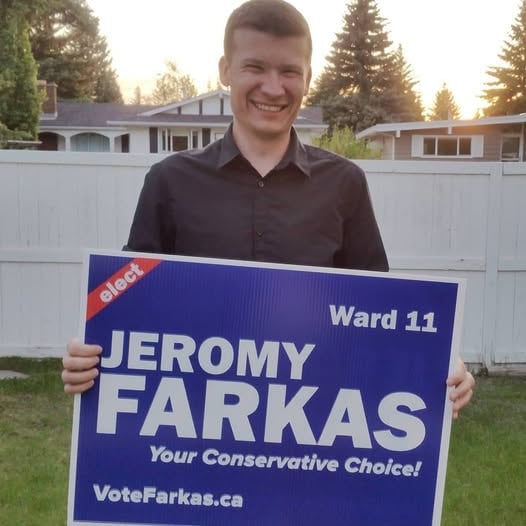
He won comfortably, joining council at age 31; his first several paycheques went to pay off his student loans.
For his 2021 mayoral run, he went with the United Conservative Party’s dark-blue colour scheme, running on a record as someone who consistently fought for tax freezes or cuts. What worked for his southwest ward seat didn’t in the city-wide race; he finished a distant second behind Jyoti Gondek.
It was that partisan reputation that made Ken Lima-Coelho hesitant when Farkas approached him in early 2022, proposing he hike 4,270 kilometres as a fundraiser for Big Brothers and Big Sisters of Calgary and Area.
“There was kind of an on-off switch, a binary around Jeromy,” Lima-Coelho, the agency’s CEO, told CBC News. “You either loved him or you didn’t.”
Lima-Coelho also had his own complex history with Farkas.
He was an executive with YMCA Calgary when it announced in 2021 it was closing its Eau Claire centre, and Farkas publicly vowed to fight for it. Lima-Coelho recalled to CBC he felt “ambushed” by the then-councillor, given how long in advance the city knew about the impending closure.
But Lima-Coelho also remembered a private meeting with him about YMCA business, when the young politician asked earnest questions about its work with Indigenous youth, questions that “given the caricature,” he didn’t expect.
“That kind of stuck with me, and I thought: hmm, there’s a different side of the guy,” Lima-Coelho said. “And that was frankly revealed in the fullness of time.”
The Big Brothers head found Farkas to be genuinely motivated to support his group. Farkas had completed triathlons before, and the 4,270-kilometre Pacific Crest Trail was a bucket-list item of his, but he wanted to raise funds for a mentorship program, in tribute to his late grandmother Lizzy, a teacher.
Lima-Coelho agreed on the “Jeromy’s Big Run” campaign, with some wariness. “It wasn’t in my plan to be his political rehabilitation project.”
Lima-Coelho was thoroughly impressed with his political celebrity fundraiser: sincere and “indefatigable,” writing more than 1,000 postcards to donors from his trail tent.
Farkas set out to raise $50,000; he wound up bringing in $200,000. Then, he continued contributing to the charity, joining its board of directors.
He also became CEO of the Glenbow Ranch Park Foundation, earning praise as he advocated to protect it from being partially damaged as part of provincial flood prevention.
Running for mayor this time, Farkas would repeatedly cite his not-for-profit experience as proof of his leadership chops, rather than focus on his past council work.
He also showed a new side in his political commentary, as a regular panelist on the Calgary Eyeopener alongside Nenshi, his old erstwhile political foe — sometimes agreeing with the man who would go on to become Alberta NDP leader in critiques of Premier Danielle Smith.
Farkas upbraided council conservatives for voting against funding for low-income transit passes, and said a UCP politician’s rhetoric about transgender youth would endanger their lives. (He openly identifies as bisexual, and has had the same female partner for more than a decade.)
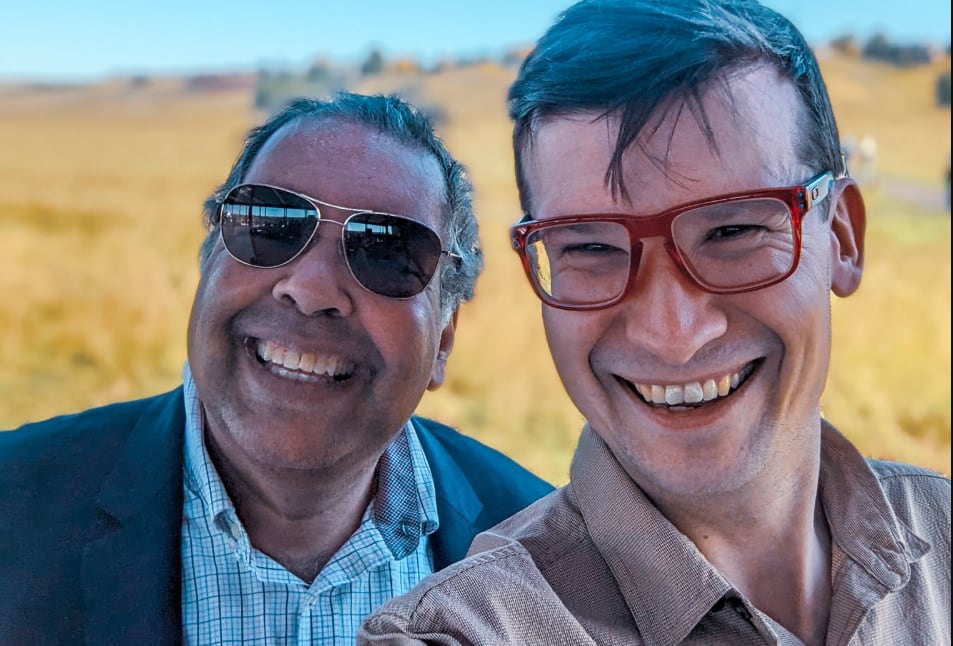
Daorcey Le Bray kept hearing Farkas say things he agreed with and recalled wondering: was I wrong about him? Le Bray, a former aide to Nenshi, said he’d grown weary of Farkas playing “the character of opposition party on council” when he left the mayor’s office during Farkas’ rookie year.
“The version of him that was in my mind might not be the actual version of him,” Le Bray said of his thoughts at the time. They had drinks on a Beltline patio, and then kept the conversation going on several more occasions.
They connected again during Nenshi’s 2024 NDP leadership campaign, and within a year Le Bray was asked to be deputy campaign manager of Farkas’ second mayoral campaign
He’d been persuaded that this new iteration was a changed Jeromy Farkas. Now, he had to persuade others.
“That was the objective of the campaign: to show who Jeromy is, authentic Jeromy, the real Jeromy,” Le Bray said.
Research suggests that it worked.
The Canadian Municipal Barometer, a project led in Calgary by political scientist Jack Lucas, asked Calgarians in the last two civic elections to place Farkas and other mayoral candidates on a 0-10 political scale, where 10 was far right and zero far left.
In 2021, respondents marked Farkas a 7.4, the most right-leaning candidate. The second time around, he ranked a 5.7 — right in the middle of his competition, and much more moderate than former councillor Sonya Sharp, this year’s runner-up.
The new Farkas didn’t win over all of Calgary — just enough to win.
The 616-vote gap between Farkas and Sharp was historically close.
Farkas in victory not only got 25,627 fewer votes than when he lost — thanks partly to lower voter turnout this election — but his share of support also dropped, to 26 per cent from 30 per cent last time.
He often insisted he was the same scrappy kid from Dover during his campaign, but it’s likely past conservative supporters did abandon him this time. That includes Lindsay Wilson, who was his council communications aide and a 2021 mayoral backer who worked for Jeff Davison in 2025.
“What I’ve seen in Jeremy is a 180 and I just don’t know what to believe anymore,” she said. “And I just think Calgarians are going to have a really hard time trusting him.”
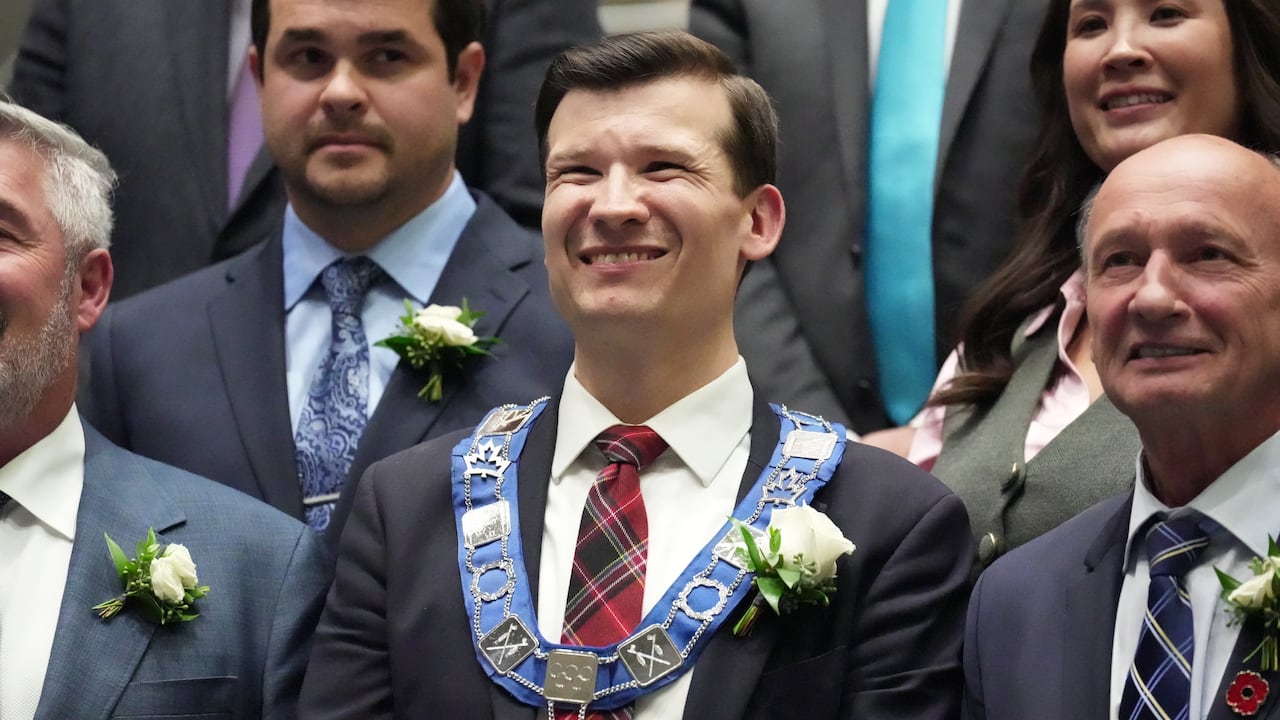
The new mayor will have to prove with his actions to convince the rest of Calgarians that he’s the right person for the job, Le Bray said.
“It will take time,” said Le Bray, who expects to work in Farkas’s mayoral office. “I don’t expect people to be like ‘Oh, now that he’s the mayor, I know who he is.’”
The key to Farkas’s success, the advisor said, will be bringing council together to make decisions for the public good, and quelling the opposition mindset that can stifle its effectiveness.
“I appreciate the irony there, but again — I’ve seen him at work,” Le Bray said. “So I know it’s real that he can do that and he’s working on it right now as we speak.”
He was talking about the one-on-one meetings and conversations Farkas was having with his new council colleagues, none of whom served with him during the term that so embittered him to many around the council horseshoe.
Years removed from his admitted “jackassery,” his election defeat, his frosty toes and punctured ego on a California crag, Farkas said in a post-victory Eyeopener interview: “I know a lot less than I did five years ago, but I’m a lot happier for it.”
He’s still a fighter, he told the show. “Instead of fighting against something, I’m fighting for something.”
On Wednesday, he was sworn in as mayor, and then got to administer the oaths to all 14 of the councillors. Lima-Coelho, who helped give Farkas’s trail hike a purpose greater than his own endurance, was there to drape the mayor’s chain of office over his shoulders.
The city staff he used to pillory were now, in the mayoral words of his inaugural speech, the “quiet engine” that runs Calgary.
Four years ago, he’d sat around that same horseshoe, with a council who’d long tired of his political antics; now, he was praising councillors as “incredible new colleagues” and “friends” he couldn’t wait to work with.
“We entered this chamber as successful candidates for office,” Farkas said. “But now we go home tonight as one team, one city council.”


